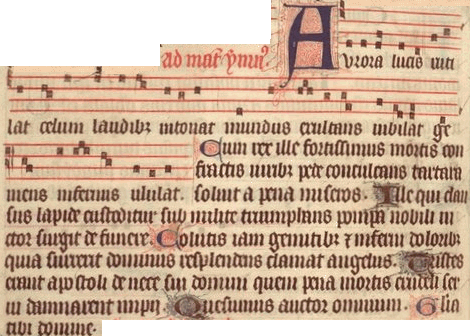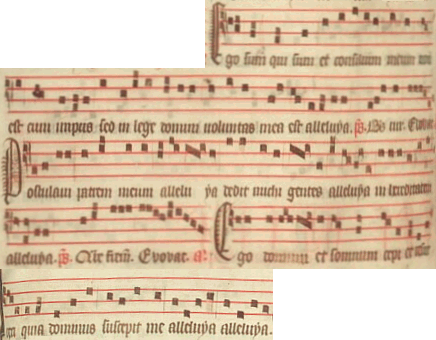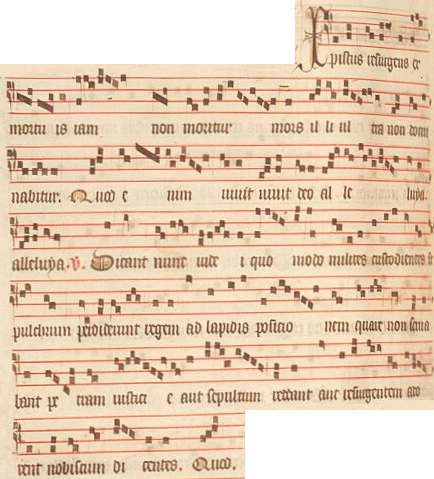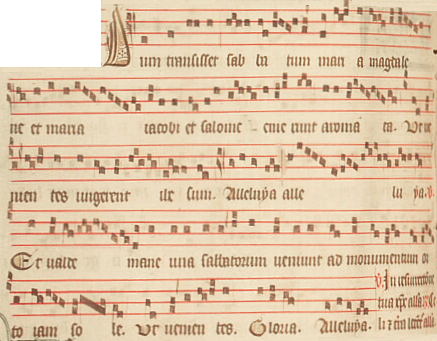Even Years: Augustine, Sermon 34, (1-3.5-6: CCL 41, 424-426)
| Cantate Domino canticum novum, laus eius in ecclesia sanctorum.
| Sing to the Lord a new song, his praise in the assembly of the saints.
| | Admoniti sumus cantare Domino canticum novum. Homo novus novit canticum novum. Canticum res est hilaritatis, et, si diligentius consideremus, res est amoris. Qui ergo novit novam vitam amare, novit canticum novum cantare. Quae sit ergo vita nova, commonendi sumus propter canticum novum. Ad unum enim regnum pertinent omnia, homo novus, canticum novum, testamentum novum. Ergo homo novus et cantabit canticum novum et pertinebit ad testamentum novum.
| We are told to sing to the Lord a new song. A new man knows a new song. A song is a thing of joy and, if we think carefully about it, a thing of love. So the man who has learned to love a new life has learned to sing a new song. Therefore we need to be told the nature of this new life, for the sake of the new song. For a new man, a new song and the New Testament all belong to the same kingdom. So the new man will sing a new song and belong to the New Testament.
| | Nemo est qui non amet, sed quaeritur quid amet. Non ergo admonemur ut non amemus, sed ut eligamus quid amemus. Sed quid eligimus, nisi prius eligamur? Quia nec diligimus, nisi prius diligamur. Ioannem apostolum audite: Nos diligimus, quia ipse prior dilexit nos. Quaere unde homini diligere Deum, nec invenies omnino, nisi quia prior illum dilexit Deus. Dedit se ipsum quem dileximus, dedit unde diligeremus. Quid enim dedit unde diligeremus, apertius audite per apostolum Paulum: Caritas, inquit, Dei diffusa est in cordibus nostris. Unde? Num forte a nobis? Non. Ergo unde? Per Spiritum Sanctum, qui datus est nobis.
| Everyone loves; the question is, what does he love? Consequently we are not told not to love, but to choose what to love. But how can we choose, unless we are first chosen? We cannot love unless we are first loved. Listen to the words of John the Apostle: We love, because he first loved us. If you search for the reason why a man loves God you will find no other reason at all, save that God first loved him. He gave us himself as the object of our love, and he gave us the source of our love. If you wish to know what he gave as the source of our love, you can find a clearer explanation in the words of the Apostle Paul: The love of God is poured out in our hearts. Where does it come from? From ourselves? No. Where then? Through the Holy Spirit, who has been given to us.
| | Habentes ergo tantam fiduciam, amemus Deum de Deo. Audite apertius ipsum Ioannem: Deus caritas est, et qui manet in caritate, in Deo manet, et Deus in illo manet. Parum est dicere: Caritas ex Deo est. Quis nostrum auderet dicere quod dictum est: Deus caritas est? Dixit qui noverat quod habebat.
| Since, then, we have such an assurance, let us love God by the gift of God. As Saint John himself expresses it more clearly: God is love, and he who abides in love abides in God, and God abides in him. It is not enough to say: 'Love comes from God.' Which of us would dare to say what Saint John said: God is love? He knew what he was saying, for he experienced this love himself.
| | Deus nobis compendio se offert. Clamat nobis: Amate me, et habebitis me, quia nec potestis amare me, nisi habueritis me.
| God offers himself to us; there is no need to offer us more. He calls out to us: 'Love me and you will possess me, because you cannot love me unless you possess me.'
| | O fratres, o filii, o catholica germina, o sancta et superna semina, o in Christo regenerati et desuper nati, audite me, immo per me: Cantate Domino canticum novum. Ecce, inquis, canto. Cantas, plane cantas, audio. Sed contra linguam testimonium non dicat vita.
| My brothers, my sons, children of the Catholic Church, holy seeds of heaven, you who have been born again in Christ, born from above, listen to me, or rather, through me: Sing to the Lord a new song. 'But I do sing', you may reply. You sing, of course you sing, I can hear you; but make sure that your life sings the same tune as your mouth.
| | Cantate vocibus, cantate cordibus, cantate oribus, cantate moribus: Cantate Domino canticum novum. Quaeritis quid decantetis de illo quem amatis? Sine dubio de illo quem amas cantare vis. Laudes eius quaeris quas cantes? Audistis: Cantate Domino canticum novum. Laudes quaeritis? Laus eius in ecclesia sanctorum. Laus cantandi est ipse cantator.
| Sing with your voices, sing with your hearts, sing with your lips, sing with your lives. Sing to the Lord a new song. Do you ask what you should sing about the one whom you love? Of course you want to sing about the one you love. Do you ask what you should sing in praise of him? Listen: Sing to the Lord a new song. Are you looking for praises to sing? His praise is in the assembly of the saints. The singer himself is the praise contained in the song.
| | Laudes vultis dicere Deo? Vos estote quod dicatis. Laus ipsius estis, si bene vivatis.
| Do you want to speak the praise of God? Be yourselves what you speak. If you live good lives, you are his praise.
|
Odd Years: Gregory the Great, Treatises on Job, Book 2:11 (SC 32, 188-190)
| Quid est enim animas uindictae
petitionem dicere, nisi diem extremi iudicii et resurrectionem exstinctorum
corporum desiderare? Magnus quippe earum clamor, magnum est desiderium. Tanto
enim quisque minus clamat quanto minus desiderat; et tanto maiorem uocem in
aures incircumscripti spiritus exprimit, quanto se in eius desiderium plenius
fundit. Animarum igitur uerba ipsa sunt desideria. Nam si desiderium sermo non
esset, propheta non diceret: desiderium cordis eorum audiuit auris tua.
| What can we say of the prayer for vindication made by the souls of the martyrs beneath the altar, other than that it is a longing for the Last Judgment and the resurrection of the dead? Their loud outcry expresses their tremendous longing; a less insistent cry would be a sign of a weaker desire. The more a soul pours out its longing for God, the louder the sound of its voice in the ears of God's infinite Spirit, for desire is the language of the soul. In fact, if desire were not tantamount to speech, the Prophet would not have said: Your ear has heard the desire of their heart.
| | Sed cum aliter moueri soleat
mens quae petit aliter que quae petitur, et sanctorum animae ita in interni
secreti sinu deo inhaereant ut inhaerendo requiescant; quomodo dicuntur petere,
quas ab interna uoluntate constat nullatenus discrepare? Quomodo dicuntur
petere, quas et uoluntatem dei certum est et ea quae futura sunt, non ignorare?
Sed in ipso positae, ab ipso aliquid petere dicuntur, non quo quicquam
desiderant, quod ab eius quem cernunt uoluntate, discordat, sed quo mente
ardentius inhaerent eo etiam de ipso accipiunt, ut ab ipso petant quod eum
facere uelle nouerunt. De ipso ergo bibunt quod ab ipso sitiunt; et modo nobis
adhuc incomprehensibili in hoc, quod petendo esuriunt, praesciendo satiantur.
Discordarent ergo a uoluntate conditoris si quae eum uident uelle, non
peterent; ei que minus inhaererent si uolentem dare, desiderio pigriori
pulsarent.
| Now it not infrequently happens that the person to whom a request is addressed takes a different view of the matter from the petitioner. The souls of the saints, however, find rest through cleaving to God in their inmost being. How, then, can we speak of their praying for something, when their will cannot be at variance with the will of God? In what sense do we say that they pray, when we know for certain that they are fully aware not of God's will but also of what is going to take place in the future?
The answer is that, united to God, they pray to him not because they want something they know to be contrary to his will, but because the more closely they are bound to him in love the more he inspires them to pray for what they know he wants to give them. And so they drink the water for which God himself makes them crave and, in a way we cannot now understand, the hunger they express in their prayer is satisfied by the knowledge they have of what lies in the future. Therefore they would be at variance with their creator's will if they did not pray for what they knew was in accordance with it, and they would not be perfectly united to him if they were slow to express their longing for what he wanted to give them.
| | Quibus responsum diuinitus
dicitur: requiescite tempus adhuc modicum donec compleatur numerus conseruorum
et fratrum uestrorum. Desiderantibus animabus: requiescite adhuc modicum
dicere, est inter ardorem desiderii ex ipsa praescientia solatium consolationis
aspirare, ut et animarum uox sit hoc quod amantes desiderant, et respondentis
deo sermo sit hoc quod eas retributionis certitudine inter desideria confirmat.
Respondere ergo eius est ut collectionem fratrum exspectare debeant, eorum
mentibus libenter exspectandi moras infundere, ut cum carnis resurrectionem
appetunt etiam ex colligendorum fratrum augmento gratulentur.
| God's reply to them is this: Be patient a little longer, until the number of your companions in the Lord's service is complete. To tell these yearning souls to be patient a little longer is to refresh and console them in their burning desire with the foreknowledge of what is yet to come. Their cry is then the expression of a loving heart's aspiration, and God's answer is to give them the assurance that their longing for vindication will be fulfilled. For him to answer that they must wait for the gathering together of their fellow servants is to instil into their minds the willing acceptance of delay and the knowledge that while they long for the resurrection of the dead they can rejoice at seeing their company grow in number.
|
| |







